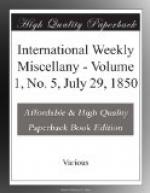Truly your friend,
JOHN E. WARREN.
* * * * *
The Rev Henry Giles, in a lecture on “Manliness,” thus designates the four great characteristics which have distinguished mankind. “The Hebrew was mighty by the power of Faith—the Greek by Knowledge and Art—the Roman by Arms—but the might of the Modern Man is placed in Work. This is shown by the peculiar pride of each. The pride of the Hebrew was in Religion—the pride of the Greek was in Wisdom—the pride of the Roman was in Power—the pride of the Modern Man is placed in Wealth.”
* * * * *
Carlyle and Emerson.—They are not finished writers, but great quarries of thought and imagery. Of the two, Emerson is much the finer spirit. He has not the radiant range of imagination or any of the rough power of Carlyle, but his placid, piercing insight irradiates the depth of truth further and clearer than do the strained glances of the latter. A higher mental altitude than Carlyle has mounted, by most strenuous effort, Emerson has serenely assumed.
* * * * *
AUTHORS AND BOOKS.
The Literature of Supernaturalism was never more in request than since the Seeresses of Rochester commenced their levees at Barnum’s Hotel. The journals have been filled with jesting and speculation upon the subject,—mountebank tricksters and shrewd professors have plied their keenest wits to discover the processes of the rappings—and Mrs. Fish and the Foxes in spite of them all preserve their secret, or at least are as successful as ever in persuading themselves and others that they are admitted to communications with the spiritual world. For ourselves, while we can suggest no explanation of these phenomena, and while in every attempted explanation of them which we have seen, we detect some such difficulty or absurdity as makes necessary its rejection, we certainly could never for a moment be tempted to a suspicion that there is anything supernatural in the




